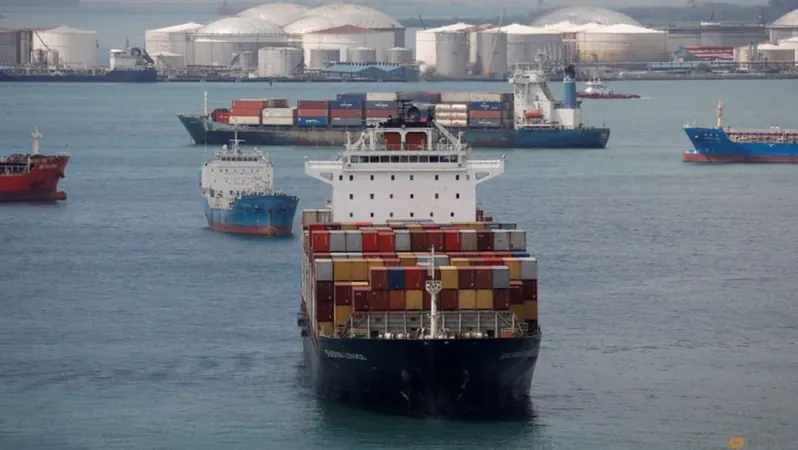
Is the World Trade System at a Breaking Point? Senior Minister Lee Hsien Loong Raises Alarming Concerns
2025-03-24
Author: Li
SINGAPORE — In a stark warning about the future of global trade amid intensifying geopolitical tensions, Senior Minister Lee Hsien Loong emphasized that the current climate of uncertainty may signal a critical juncture for world commerce. Speaking on March 24 during the inaugural session of Singapore Maritime Week (SMW), Lee stated, “It cannot be assumed that global trade will keep pace with the world’s GDP.”
He underscored that a decline in the trade-to-GDP ratio could herald significant economic and strategic consequences. "At the very least," he noted, "this would stifle economic growth across nations and exacerbate social and political issues, both locally and globally.” He suggested that the world might be entering a transformative era, unparalleled since World War II.
Lee reflected on Singapore’s historical success, growing as an open economy alongside global trade during the past six decades. He recalled how international trade has not only bolstered Singapore but has also been integral to worldwide economic expansion. “Our nation has strategically positioned itself as a reliable trade hub, linking the East and West,” he remarked.
However, the landscape has shifted dramatically. Major powers have adopted more transactional and sometimes coercive strategies to fulfill immediate demands, sidelining the previous win-win stance of international trade. The recent changes, especially from the United States under a new administration, highlight a growing cynicism towards traditional trade partnerships.
Lee elaborated on the challenges posed by climate change, noting that it is disrupting established trade routes and will compel the maritime sector to innovate ways to reduce carbon emissions. “With international shipping accounting for roughly 3% of greenhouse gas emissions, the industry must adapt to preserve our planet,” he stated, drawing particular attention to the impact of extreme weather on critical points like the Panama Canal.
What Singapore Is Doing to Counter Challenges
In this uncertain environment, Singapore is set to uphold its commitment to an open trading system. “Being a small nation, we have no choice; however, even amidst rising protectionism, many countries still recognize the mutual benefits of trade,” Lee explained.
Furthermore, the nation continues to invest heavily in its maritime infrastructure, including the upcoming Tuas Port, which is expected to handle 65 million twenty-foot equivalent units (TEUs) by the 2040s. This expansion is crucial, as the maritime sector currently contributes over 6% to Singapore's GDP and supports approximately 140,000 jobs.
Alongside trade initiatives, Singapore is focused on making strides toward sustainability. By committing to peak emissions before 2030 and achieve net-zero emissions by 2050, the country is positioning itself as a leader in green technologies essential for the industry's transition.
Lee emphasized that while uncertain times are ahead, by planning strategically and proactively, there's potential for the maritime industry to continue thriving.
The Fragile US-China Relationship: A Recipe for Turmoil?
In an engaging dialogue with Professor Chan Heng Chee during the event, Lee expressed doubt about the prospect of a “grand bargain” between the US and China that could ease rising tensions. He highlighted the contrasting perspectives of both nations, with the US viewing China as a strategic threat while China perceives the US as an obstacle to its growth.
Lee pointed out that the deep-seated issues—ranging from trade imbalances to cybersecurity—are complex and unlikely to be resolved through any singular agreement. He warned that the repercussions of a potential conflict between these two superpowers could be catastrophic, not just for them but globally.
Reflecting on historical lessons from the Great Depression, he recalled how protectionist measures led to economic collapse and geopolitical strife. “The parallels are concerning,” Lee cautioned. The world is now witnessing the potential strife between two nuclear powers, with the stakes higher than ever.
As tensions rise and economic challenges loom, Lee's message is clear: the road ahead is fraught with uncertainties, but through collaboration and strategic foresight, there is hope for a prosperous future.
“They won't be easy times, but we must fasten our seatbelts and prepare for the journey ahead,” he concluded.


 Brasil (PT)
Brasil (PT)
 Canada (EN)
Canada (EN)
 Chile (ES)
Chile (ES)
 Česko (CS)
Česko (CS)
 대한민국 (KO)
대한민국 (KO)
 España (ES)
España (ES)
 France (FR)
France (FR)
 Hong Kong (EN)
Hong Kong (EN)
 Italia (IT)
Italia (IT)
 日本 (JA)
日本 (JA)
 Magyarország (HU)
Magyarország (HU)
 Norge (NO)
Norge (NO)
 Polska (PL)
Polska (PL)
 Schweiz (DE)
Schweiz (DE)
 Singapore (EN)
Singapore (EN)
 Sverige (SV)
Sverige (SV)
 Suomi (FI)
Suomi (FI)
 Türkiye (TR)
Türkiye (TR)
 الإمارات العربية المتحدة (AR)
الإمارات العربية المتحدة (AR)